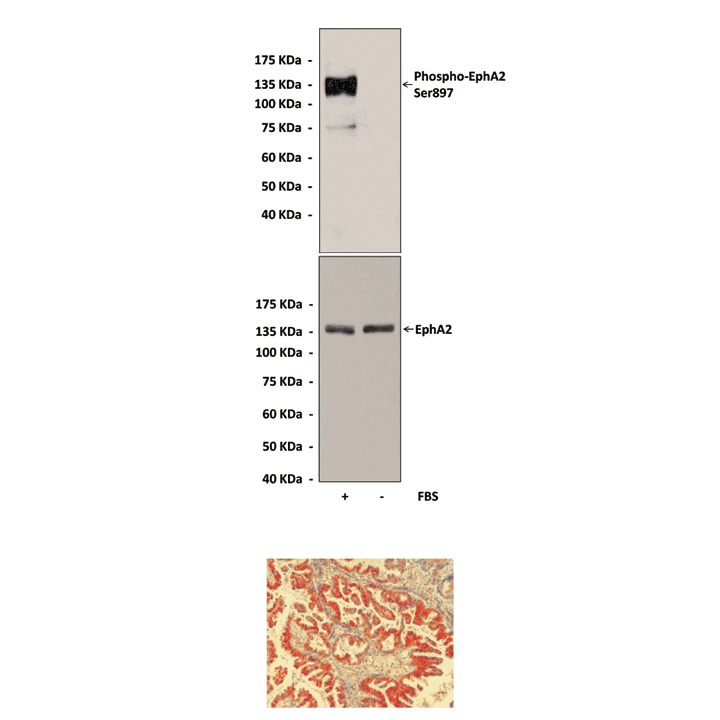Product Sheet CY1108
Description
BACKGROUND Eph family of receptor tyrosine kinases consists of at least 14 distinct receptors and has eight membrane-bound ligands, known as the ephrins. This is the largest family of receptor tyrosine kinases. Eph proteins are divided into two subfamilies: the EphA receptors (A1-A8) that bind glycosyl phosphatidylinositol (GPI)-linked ephrin-A ligands (A1-A5), and the EphB receptors (B1-B6) that bind transmembrane ephrin-B ligands (B1-B3). The only known crosstalk between the A and B subfamilies occurs with the EphA4 receptor, which can bind ephrins-B2 and -B3 as well as the entire A subclass. There is a great deal of redundancy of receptor-ligand binding specificity within each subfamily, although binding affinities vary.1,2 One of the unique features of Eph/ephrin signaling is the fact that both receptors and ligands are competent to transduce a signaling cascade upon interaction. Eph-activated signaling is termed forward, and ephrin-activated signaling is termed reverse. Another level of complexity stems from the fact that interactions between Eph receptors and ephrins can happen in trans (between two opposing cells) or in cis (within the same cell). It is commonly assumed that trans interactions are activating while cis interactions are inhibiting.3 EphA2 is a transmembrane receptor tyrosine kinase that is up-regulated on many aggressive carcinoma cells. Despite its overexpression, the EphA2 on malignant cells fails to bind its ligand, ephrinAl, which is anchored to the membrane of adjacent cells. Unlike other receptor kinases, EphA2 demonstrates kinase activity that is independent of ligand binding. However, ligand binding causes EphA2 to negatively regulate tumor cell growth and migration.4 Both pro- and antioncogenic properties have been attributed to EphA2 kinase. It was reported that while activation of EphA2 with its ligand ephrin-A1 inhibited chemotactic migration of glioma and prostate cancer cells, EphA2 overexpression promoted migration in a ligand-independent manner. Surprisingly, the latter effects required phosphorylation of EphA2 on serine 897 by Akt, and S897A mutation abolished ligand-independent promotion of cell motility. Ephrin-A1 stimulation of EphA2 negated Akt activation by growth factors and caused EphA2 dephosphorylation on S897. In human astrocytoma, S897 phosphorylation was correlated with tumor grades and Akt activation, suggesting that the Akt-EphA2 crosstalk may contribute to brain tumor progression.5 Moreover, It was shown that the extracellular molecular chaperone heat shock protein 90 (eHsp90) supports glioblastoma multiforme (GBM) cell motility, in part by interacting with EphA2 and modulating receptor stability and function. eHsp90 was found to promotes the recruitment of LRP1, a co-receptor for EphA2, to EphA2 in an AKT dependent manner. There is a novel crosstalk mechanism whereby eHsp90-LRP1 signaling is an obligate step in AKT mediated phospho-EphA2 (Ser897) activation, an event required for subsequent GBM cell invasion.6
REFERENCES
1. Brantley-Sieders, D.M. & Chen, J. : Angiogenesis. 7:17, 2004.
2. Murai, K.K. & Pasquale, E.B. : J. Cell Sci. 116:2823, 2003.
3. Arvanitis, D. & Davy, A.: Genes & Dev. 22:416, 2008.
4. Carles-Kinch, K. et al: Cancer Res. 62:2840, 2002.
5. Miao, H. et al: Cancer Cell 16:9-20, 2009
6. Gopal, U. et al: PLoS ONE 6:e17649, 2011
2. Murai, K.K. & Pasquale, E.B. : J. Cell Sci. 116:2823, 2003.
3. Arvanitis, D. & Davy, A.: Genes & Dev. 22:416, 2008.
4. Carles-Kinch, K. et al: Cancer Res. 62:2840, 2002.
5. Miao, H. et al: Cancer Cell 16:9-20, 2009
6. Gopal, U. et al: PLoS ONE 6:e17649, 2011
Products are for research use only. They are not intended for human, animal, or diagnostic applications.

(Click to Enlarge) Top: Western Blot detection of phosphorylated EphA2 (Ser897) proteins in primary human astrocytes stimulated with 20% FBS using phospho-EphA2 (Ser897) Antibody (Cat# CY1108) and EphA2 Antibody (Cat# CC10025). Bottom: IHC staining of paraffin-embedded human ovarian cancer tissue using Phospho-Ser897 EphA2 Antibody.
Details
Cat.No.: | CY1108 |
Antigen: | Raised against a short peptide sequence surrounding and containing phospho-Ser897 of human EphA2. |
Isotype: | Rabbit IgG |
Species & predicted species cross- reactivity ( ): | Human, Mouse, Rat |
Applications & Suggested starting dilutions:* | WB 1:1000 IP n/d IHC 1:50 ICC n/d FACS n/d |
Predicted Molecular Weight of protein: | 140 kDa |
Specificity/Sensitivity: | Detects endogenous phosphorylated EphA2 (Ser897) proteins without cross-reactivity with other family members. |
Storage: | Store at -20°C, 4°C for frequent use. Avoid repeated freeze-thaw cycles. |
*Optimal working dilutions must be determined by end user.
Products
| Product | Size | CAT.# | Price | Quantity |
|---|---|---|---|---|
| Rabbit EphA2, Phospho-Ser897 Antibody: Rabbit EphA2, Phospho-Ser897 Antibody | Size: 100 ul | CAT.#: CY1108 | Price: $384.00 |
Resources/Documents
Publications
2014
Staudacher, I., J. Jehle, K. Staudacher, H. Pledl, D. Lemke, P. Schweizer, R. Becker, H. Katus and D. Thomas. 2014. Herg K+ Channel-Dependent Apoptosis and Cell Cycle Arrest in Human Glioblastoma Cells. PLoS ONE, doi.org/10.1371/journal.pone.0088164.
2010
Faoro, L., P. Singleton, G. Cervantes, F. Lennon, A. Husain, M. Tretiakova, N. Ramnath, E. Vokes, and R. Salgia. 2010. EphA2 Mutation in Lung Squamous Cell Carcinoma Promotes Increased Cell Survival, Cell Invasion, Focal Adhesions, and Mammalian Target of Rapamycin Activation. JBC 285:18575-18585.
